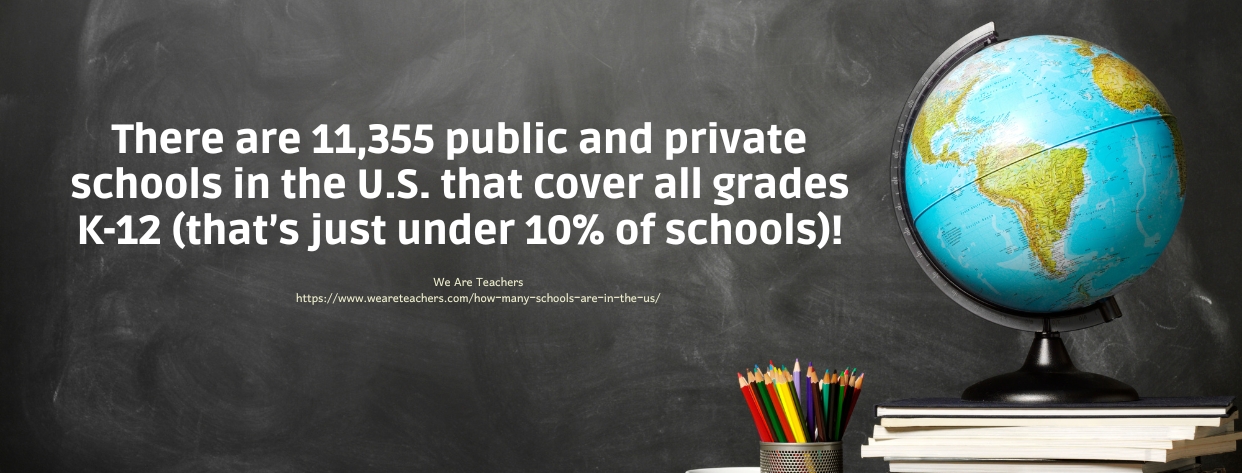10 Best Grad Schools with Online Doctorate in K-12 Education

Find your perfect college degree
All doctorate degree programs in education allow professionals to unlock leadership roles within K-12 institutions. Doctorates in K-12 Education, however, are more specific. This doctorate concentration gives you more competence when applying for positions in K-12 institutions or organizations dedicated to K-12 education.
Doctorates in K-12 Education programs provide students with the complex theoretical and organizational management knowledge to oversee current issues faced by primary and secondary school settings.
Additional Resources:
- Best Grad Schools with Online Doctorate in Elementary Education
- Best Grad Schools with Online Doctorate in Education
- Best Grad Schools with Online Doctorate in Science Education
Overview
Doctoral programs with a K-12 Education concentration prepare students to meet the issues of today’s challenging educational landscape. Online doctoral degree programs in K-12 Education allow students to earn an advanced degree from an accredited college or university without leaving their current positions. Following the same curriculum as their on-campus counterparts, graduates can pursue various careers, including directors, principals, school administrators, and postsecondary teachers.
Methodology
To help students obtain a valuable advanced degree online, this list of K-12 Education online doctorates features each program’s top academic features, such as the following:
- Has proper accreditation to ensure that current and future employers will recognize the degree,
- Offers asynchronous and synchronous online classes held at convenient times for working adult students,
- Encourages online students to become a part of a well-established network of alums,
- Provides students support from student services and faculty mentors that will help them navigate their way through graduate school,
- Offers an academically rigorous curriculum that equips students with the necessary visions and skills to become education leaders and lead K-12 institutions of the 21st century,
- Allows online students to engage in an intensive study of research design and content knowledge,
- Courses are taught by education professionals with expertise in supervisory, curricular, and administrative roles.
Visit our Methodology and explore our ranking process.
Top 10 Grad Schools with Doctorate in K-12 Education Online
William Woods University

Doctorate in Educational Leadership: K12 Education
William Woods University offers an online EdD in Educational Leadership degree program that provides students with a K-12 Education concentration. This online education doctorate provides students with coursework that integrates advanced professional development and training to prepare them for the issues faced by various educational institutions. Tailored to fit the needs of working adult students, this online program can be completed in two years or less, 100% online, with optional on-campus activities.
As a leadership doctorate, this program includes courses in Leadership, Educational Systems, Organizational Learning & System Change, and Program Evaluation & Strategic Plan, among others. Through intense coursework and research, students will develop leadership, analytical, and organizational abilities they can use to create strategies for their own educational environments.
Students will have the chance to pick up knowledge from working professionals in the industry and establish the network necessary for leadership and professional advancement.
Interested candidates should have their education specialist or master’s degree earned from a reputable college or university with a minimum of 3.6 GPA on all attempted graduate coursework. A completed application, official transcripts, academic letters of reference, CV, and leadership statement are required of applicants.
Grand Canyon University

Doctor of Education in K-12 Organizational Leadership – Qualitative
Grand Canyon University’s EdD in K-12 Organizational Leadership is designed for educational professionals who want to personally study and evaluate events to better comprehend an observed phenomenon instead of using numerical data.
The curriculum of this online education program helps students develop leadership, ethical, and community-building skills focused on K-12 education, trends, and issues. This is a 60-credit hour doctorate that can be completed in two years, depending on the number of credits students take each semester.
History and Politics of K-12 Education, Strategic Planning in K-12 Education, Governance and Structures in K-12 Education, and Trends and Issues in K-12 Education are a few of the program’s required courses. The program’s coursework allows students to build expertise and understand how and why people think, believe, and behave a certain way.
All program courses are given in an 8-week accelerated format, allowing students to graduate faster.
Students can transfer only up to 9 credit hours to the doctoral program. Master’s degrees earned from a non-regionally accredited institution are not accepted, except for international degrees (which have their own credibility evaluation process). There’s a minimum GPA requirement of 2.8/4.0. Students who do not meet the minimum GPA must have a 500 on their GMAT and 1,000 combined on their GRE.
Michigan State University

Doctorate in K-12 Educational Administration
Michigan State University’s Doctorate in K-12 Educational Administration degree, thanks to its reputation for giving students one-on-one guidance for their research and goals, is one of the best doctors of education degree programs.
As a practice-based doctoral degree, students can immerse in various school organizations to showcase their learning throughout the program. MSU also allows students to participate in the Education Policy Innovation Collaborative (EPIC) and the Office of K-12 Outreach programs that offer opportunities for doing and disseminating educational research.
Students acquire inquiry and research techniques used to look into important issues affecting K–12 education through courses and individualized learning plans. Featured courses of the program include Political Economy of Schooling, Analyzing Educational Systems, and Organizing for Learning.
Upon completion of coursework, graduates will be able to formulate questions, and carry out and articulate rigorous investigations for professional practice. Students will move in cohorts.
To prove your competency for the program, you need to submit a master’s degree earned from an accredited school with a GPA of 3.0 at the minimum. Additional requirements include at least three years of professional educational practice. While students can complete the program part-time or full-time, they must enroll in at least six credits per semester.
University of Southern California

Doctor of Education in Educational Leadership – Concentration in K-12 Education
The University of Southern California’s EdD in Educational Leadership allows students to concentrate their efforts on gaining expertise in improving K-12 in Urban School Settings. This is a three-year online doctor of education designed to meet the needs of working education professionals. The program is focused on training its students to address educational injustices impacting learning opportunities and outcomes. Students will meet in a real-time virtual classroom.
The program’s curriculum allows students to choose between Leadership for Principals or Leadership for Superintendents course sequencing. Regardless of which path they choose, students will receive a curriculum that prepares them for site, district, and systems leadership roles.
Moreover, students complete a dissertation in practice that requires them to use pertinent research techniques to address a practical issue restricting access to equal educational opportunities.
Interested applicants must possess a master’s degree from a regionally accredited higher education institution. Once admitted to the doctoral program, students are automatically considered for a small number of $10,000 merit-based scholarships. There is no need to submit a separate application for scholarships.
Arizona State University

Doctor of Education in Leadership & Innovation: PreKindergarten-Grade 12 Change Leadership
The EdD in Leadership and Innovation at Arizona State University offers an online PreKindergarten-Grade 12 Change Leadership concentration designed for practicing educator-leaders. Students will spend most of the doctoral program investigating, conceiving, and implementing change initiatives in leader-scholar community groups in the second and third years. Leader-scholar community organizations can help them with their dissertation research as well.
Students in this concentration will explore various topics, including leadership, transmedia, program design, and policy management. Students can collaborate with professionals actively working in various educational sectors, allowing them to gain more practical experiences and foster a network that will help them prepare for more advanced academic roles.
Applicants must be employed in an educational position that allows them to implement small-scale change. They’re also expected to have a 3.0 cumulative GPA or higher on their accredited master’s degree. Additional requirements include letters of recommendation, a personal statement, a current CV or resume, and a writing sample.
South College

Doctor of Education in Teaching and Learning (K-12 Education)
South College offers an online Doctor of Education that provides students with three concentrations, including a Teaching and Learning K-12 Education. Students seeking a competency-based degree with accelerated formats for lesser overall cost can consider this online doctorate that can be completed in 2.5 years, with a 6-month subscription-based semester. Students must complete 9 courses and a dissertation to earn the degree, totaling 90 quarter hours.
Designed for professionals seeking to enhance instructional strategies, South College’s EdD in K-12 Education provides an engaging and inclusive learning environment that helps education professionals better comprehend the various needs of K–12 pupils.
Coursework of the program explores Pedagogy and Curriculum Development, Educational Leadership and Advocacy, and Classroom Management, among other courses, to give students the capacity to contribute to the educational system.
In addition to the program’s dissertation and coursework requirements, students must complete comprehensive, cutting-edge tests to demonstrate their mastery of the field.
To succeed, students will have an academic advisor to help them set their own timelines and goals and stay on track with their coursework. Students with a master’s degree from a regionally accredited institution and a 2.75 or higher GPA are qualified to apply for the program.
Virginia Commonwealth University

Doctor of Education in Leadership: K12 Leadership
The online EdD at Virginia Commonwealth University offers a K-12 Leadership doctorate for professionals seeking skills to improve the K-12 education system. This online doctoral program, housed by a department member of the CPED-Carnegie Project on the Education Doctorate, is one of the most rigorous online educational doctorates.
Students can earn the degree in 36 months of full-time study. Students must complete a collaborative group Capstone study.
The program will focus on action-oriented andragogy and curriculum to provide professionals in various learning organizations with practical knowledge and skills. Coursework of the program includes the application of theory and research and topics in Data Visualization, Policy & Ethics, Educational Law, and Equity & Leadership, among others.
While students can complete coursework online, they must attend the program’s two to three-day residency requirement every summer; this on-campus intensive fosters relationships and supports program achievement.
Interested applicants must turn in three letters of recommendation, a statement of intent, transcripts, and professional vitae/resume. A master’s degree from a regionally accredited US college/university is required; however, there’s no set GPA cutoff. Applicants may also be required to visit the campus for a personal interview to evaluate their suitability for the program.
University of Mississippi

Doctor of Education in K-12 Educational Leadership
The University of Mississippi’s EdD in K-12 Educational Leadership is a hybrid doctorate founded upon strong research on good leadership practices. This doctor of education is specifically designed for those seeking training as advanced professional practitioners.
This 3-year, 57-credit hour online EdD requires students to move in cohorts that mandate six problem-based weekend seminars each semester. The program’s instruction uses practice-based applications of cutting-edge school transformation research to provide students with the required skills for district-level advanced educational leadership roles.
Courses of the program include Educational Leadership Seminar, Dissertation in Practice, Leadership and Organizational Theory into Practice, and School Finance and Facilities Planning and Management. Doctoral candidates must create, carry out, evaluate, and revise a three-year organizational reform project as part of their practical dissertation-in-practice. Each student will have a one-on-one session with a faculty member before starting their dissertation project to ensure student success.
Applicants should have a specialist or master’s degree earned at a regionally accredited higher learning institution with an active state school administrative license and be employed as an educational administrator. Additional requirements include three years of full-time work experience, a 3.5 GPA, high GRE scores, and three letters of reference. Applicants will be called for a final interview.
Rockhurst University

Doctor of Education in K-12 Leadership
Rockhurst University offers an online EdD in K-12 Leadership open for currently employed education professionals seeking an advanced professional practice program that can be completed 100% online. Students progress through the program in cohorts to build close networks and relationships with their peers and faculty members, which will help them significantly in personal and professional growth and development.
Following the same on-campus curriculum, the program provides students with specialized knowledge to keep up with a rapidly changing educational environment.
Educational Systems and Policy, Teaching, Learning, & Curriculum, and Applied Research courses are the program’s three themes that students must undergo to complete the degree. This online doctorate in education allows students to pursue Diversity, Equity, and Inclusion (DEI) or Science, Technology, Engineering, Art and Math (STEAM) certifications. The DEI certification is for doctoral students seeking to understand social justice in a multicultural society, while the STEAM certificate allows students to incorporate technology into their curriculum and instruction. Both certificate programs entail 12 credit hours.
Applicants’ master’s degrees should have a cumulative GPA of 3.0 or higher and be earned from a regionally accredited institution. International applicants should have their degrees evaluated. Additional requirements include two letters of professional recommendation, a personal statement, a research statement, and a resume.
Widener University

Doctor of Education in K-12 Educational Leadership
Widener University’s EdD in K-12 Educational Leadership is a hybrid doctoral program that equips students with the advanced knowledge and skills for administration and leadership positions in various academic settings. This doctoral program is designed to accommodate working adult students, allowing students to earn the degree at their own pace. Online courses are offered in asynchronous learning formats to help students balance their studies and coursework.
Students pursuing top executive roles can integrate a business concentration into the EdD program and superintendent certification. Students can also pursue a Low-Residency EdD focusing on International and Independent Schools Leadership, which only requires students to attend a 3-week summer residency in Athens and another 3-week residency in Philadelphia, New York, and Washington, DC. School Architecture and Plant Management, Policy and Public Relations in K–12 Education, and Technology and Leadership are three of the program’s professional core coursework.
Applicants should send their official transcripts of their bachelor’s and master’s degrees, two letters of recommendation, and a personal statement. An admissions interview is also necessary to evaluate the applicant’s suitability for the hybrid doctoral program.
What To Expect From an Online Doctoral Degree Program in K-12 Education
K-12 Education is one of the many concentrations offered in education doctorates. Each concentration will have its own set of required coursework, requirements, timeline, and other demands. Some K12 Education doctorates focus solely on K–12, while others cover pre-kindergarten through 12th grade.
Online K-12 Education EdDs typically require students to complete 40 to 70 credit hours, which can be completed in two to five years. Students who enroll full-time can complete the program faster than those who pursue it part-time. Program coursework is usually divided into four: core coursework, specialization courses, electives, and dissertation research.
Core Coursework
Advanced theories and concepts essential to K–12 administration and quantitative and qualitative research techniques useful in educational settings are frequently emphasized in core courses.
Because each K-12 Education program has its unique requirements, coursework, and titles might vary. However, the most common core coursework found in K-12 Educational doctorates include
- Educational Leadership Principles
- Curriculum Theory
- Educational Measurement, Assessment, and Evaluation
- Legal Issues in School Administration
These core courses are designed to develop the student’s fundamental knowledge about education in general for a more effective educational leadership style. Students will explore topics on the laws that govern educational institutions, curriculum models, and theories and be able to develop valid and reliable assessment tools and use assessment data to improve teaching and learning.
Specialization Courses
Students will start enrolling for specialized coursework after completing the required core courses. Depending on the student’s enrollment status, this usually occurs in their third semester. The specific courses students take will primarily depend on their program’s focus, although the following are some examples of potential specialization areas they might encounter:
Technology in K-12 Education Course:
This course examines how technology can be effectively integrated into K–12 learning environments. Students gain knowledge of a range of educational technology, such as hardware, software, online resources, and learning management systems. Digital literacy, blended learning, virtual reality, educational games, and the use of technology for individualized learning are some topics that could be covered.
School Resource Management:
This course addresses the challenges and issues pertinent to schools and focuses on resource management within K–12 educational institutions. Budgeting and financial management, facility management, human resources, strategic planning, grant writing, and fundraising are some examples of topics under these specialized courses. It aims to equip K-12 school leaders and administrators with the knowledge and skills to allocate resources that benefit students and the school.
Education Policy and Reform:
In this course, students will learn about the evolution of educational policies and how they affect K-12 educational systems and institutions. It might look at current movements for educational reform, difficulties with implementing policies, and assessments of how well they work. It aims to give students a thorough understanding of initiatives for reforming and developing educational policy.
Teaching Diverse Populations:
This course focuses on teaching in multicultural K–12 classrooms and addressing the needs of students from varying socioeconomic, linguistic, and cultural backgrounds. It discusses social-emotional learning, inclusive education, English language learners, and culturally sensitive teaching.
Electives
Most online K-12 Education doctorates allow students to select electives to tailor their degree programs further. During this coursework stage, students can study particular professional abilities or specialty areas that closely align with their professional goals.
Some online programs allow online students to enroll in courses beyond the department, while others suggest that students choose coursework in the same department. Two of the most popular electives in K-12 doctoral concentrations include:
Professional Development
This elective will help education professionals unlock the skills and knowledge necessary for creating and implementing effective professional development initiatives. This course helps doctoral students stay informed of the most recent standards and techniques for instruction.
Special Education
Education professionals already employed or seeking employment in special education teaching are best to enroll in EdDs with this elective. Special education concentration/elective covers topics that develop students’ abilities in creating a supportive learning environment for kids with physical, mental, or learning challenges. Some special education electives allow students to focus on one or more challenge/s.
Topics may vary, depending on your chosen concentration. But in general, students under this elective explore various teaching methods for special education and identify the unique difficulties associated with running this kind of classroom.
Doctoral Dissertation
Those pursuing a doctorate in K–12 education must complete a doctoral dissertation as their capstone research project to receive their degree. The dissertation is academic research that adds to the knowledge about K–12 education. It is a sizable and demanding research project that exhibits the student’s capacity to conduct independent research, critically evaluate material, and reach insightful findings regarding K–12 education.
Career Paths for Graduates of Doctoral Programs in K-12 Education
While there are various positions one can pursue using a doctorate in K-12 Education, most are management positions in academic settings, from elementary to high schools. Positions one might qualify for vary depending on several factors, including licensure, background, and doctoral specialization.
EdDs, while being the highest degree, do not automatically grant graduates licensure in specific fields. EdDs significantly help professionals obtain the knowledge and skills for passing state licensing exams and the necessary tests or other requirements after earning their degree.
Sitting for the licensure exam to become a principal does not typically require a doctorate. Usually, a master’s degree or a graduate certificate is necessary for this employment. Nevertheless, obtaining a doctorate can assist aspiring school administrators in acquiring the skills and experience essential to succeed in these positions. It may be required for those wishing to rise into district-wide positions, such as superintendent. Doctorates can also help you pursue higher education leadership positions.
Some of the most common career paths for doctorate K-12 education graduates can anticipate unlocking include:
Charter School Executive Director
Charter schools are semi-autonomous organizations that operate outside the public education system but still get financing from the government. Unlike private schools, they are free and open to all students. They are managed in a variety of ways. Still, they often rely on an executive director to oversee organizational strategy, mentor top leadership, and advance the goal outlined in the school charter or network.
Charter School Executive Directors have an average yearly salary of $174,893.
Superintendent
These leaders supervise groupings of public schools, frequently making essential decisions and acting as the public face of an entire district of schools. They work with the district’s elected school board to establish and attain academic goals, and they oversee all significant program, budget, and personnel decisions made at the schools that fall under their authority.
The Bureau of Labor Statistics projects job openings for Top Executives are 318,100 over the next decade, with an expected growth rate of 3 percent from 2022 to 2032 and a median yearly pay of $100,090.
Principal
Principals are employed at elementary, middle, and high schools. They oversee every staff member in every aspect of their organizations, including curriculum development and implementation, teacher evaluation, and even student discipline.
Principals ensure that their school complies with all district, state, and federal requirements. Moreover, they ensure that teachers have the resources they need to accomplish their jobs and are responsible for their student population’s general safety and academic achievement.
Elementary, Middle, and High School Principals have a median pay of $101,320 annually. It has an expected growth rate of 1 percent from 2022 to 2032, says the BLS.
Special Education Director
Special education directors oversee the unique needs of students with physical or mental challenges. They are often responsible for monitoring all special needs kids’ educational and support services as well as the related staff, as well as for evaluating the success of these programs and making any necessary adjustments. They may work for an entire district, a specific school, or a building specifically designed for this instruction.
According to Zippia, the average yearly salary of Special Education Directors is $80,520.

Frequently Asked Questions
What is the role of a K-12 Educational leader?
K-12 educational leaders are responsible for monitoring and directing the administration of a school or school district from kindergarten through grade 12. They are in charge of establishing educational objectives, supervising personnel, putting policies into place, and guaranteeing the overall success of the educational institution.
What are the prerequisites for enrolling in K-12 Education programs?
Although prerequisites may differ from school to school, most call for a master’s degree from a regionally accredited university and job experience in education. Additionally, GRE or other standardized test scores can be needed for some programs.
Are Doctor of K-12 Education programs available fully online?
Several colleges and universities offer fully online doctorate degrees in K–12 education. Fully online programs may have optional on-campus intensives/opportunities for students who want to get to know their peers and faculty in person. Students who participate in on-campus opportunities have better chances to create a professional network for growth and development.
Can students specialize in a specific area within K-12 Education?
Yes, some doctor of education programs offer alternatives for concentration within K-12 education. Some examples of specializations include curriculum creation, special education leadership, instructional leadership, instructional technology, and educational policy and administration.
What is the purpose of accreditation in K-12 education doctorates?
Accreditation in K-12 education doctorates ensures that the program and its curriculum uphold quality, integrity, and effectiveness. Regional accreditations, such as the Higher Learning Commission and the Southern Association of Colleges and Schools Commission on Colleges, ensure that the institution and its program meet established criteria for academic rigor, curriculum content, faculty qualifications, and program outcomes.
How are online Doctor of Education programs in K-12 Education?
The average length of doctor of education degree programs is two to three years.
Key Takeaways
- Students who pursue EdDs in K–12 Education are prepared for the difficult and complex task of leadership in these environments.
- The curriculum of online EdD in K-12 Education is identical to its on-campus program, requiring students to undergo intensive research and applied skills training.
- Graduates can earn a principal, special education director, or superintendent license.




